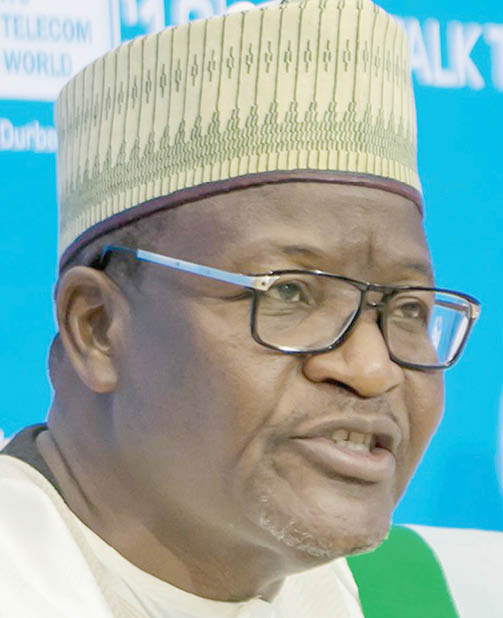During the COVID-19 pandemic and consequent economic turmoil, mobile internet connectivity continued to grow. For the first time, more than half of the world’s population – just over 4 billion people – are using mobile internet. In 2020, coverage continued to increase across the world, with 94% of the population now covered by a mobile broadband network.
In Nigeria, broadband penetration recorded a quantum leap in the last seven months from November 2021 with a record of seven million new subscriptions, indicating a steady rise in the nation’s quest to achieve 70 per cent national coverage by 2025.
- NIGERIA DAILY: Pump Price Increases As NNPC Unveils New Era
- Ondo worst hit by mass exodus of doctors, health workers, in S’west – NMA
Internet user penetration in Nigeria saw a slight increase between the years 2017 and 2022, going from around 26 per cent to over 38 per cent. As of 2022, the estimated number of internet users in the country is more than 108 million.
This increase is after the losses, both in subscriptions and revenues, recorded in late 2020 and most parts of 2021 due to the ban on SIM card sales by the federal government.
For the larger part of 2021, statistics showed that penetration dropped considerably, with about 3.9 per cent rate.
This is despite the ongoing implementation of the country’s new National Broadband Plan (2020-2025), whose target is to achieve a 90 per cent penetration rate in terms of population and a 70 per cent reach in terms of the country’s total landmass by 2025.
But between November 2021 and January 2022, the network added 3.2 million new users to the network, which pushed the subscription to 79.4 million as of January’s ending.
Statistics from the Nigerian Communications Commission (NCC) showed an increase in subscriptions, which brought the broadband penetration in the country to 41.61 per cent from 39.89 per cent recorded in October 2020.
However, from a peak point of 45.93 per cent in October 2020, broadband penetration in Nigeria slipped to 39.79 per cent in July 2021. The decline, which started before the ban on new SIM registration in December 2020, was worsened by the policy as the operators lost many broadband customers during the four-month ban.
Experts and NCC predict the share of the Nigerian population that uses the internet via any device at least once a month, is expected to grow up to 60 per cent, approximately, in 2026.
Speaking on the implementation of the NNBP 2020-2025, the Minister of Communications and Digital Economy, Prof. Isa Ali Ibrahim Pantami, said broadband penetration was key to reviving the Nigerian economy.
Quoting from the reports from the World Bank and the World Economic Forum, Pantami said 10 per cent of broadband penetration in any country would improve its GDP by at least 4.6 per cent.
The minister stated that the NBP addresses three of the eight priorities that the federal government assigned to the Federal Ministry of Communications and Digital Economy, and the parastatals under its purview, for implementation.
“These priorities are the implementation of broadband connectivity and execution of a plan to deploy 4G across the country, as well as the development and implementation of a digital economy policy and strategy,” he said.
The implementation of the plan, he said, would lead to the creation of jobs, improved socioeconomic development, and sustained economic growth, among others. “However, it is important to note that the successful implementation of the plan requires synergy between government and the private sector.
As such, he said the plan had received input from all stakeholders and would be driven by the private sector, with the government providing the enabling environment.
“Digital technology offers Nigeria the opportunity to grow and diversify its economy from the overdependence on oil and gas export proceeds”, he added.
The President of the National Association of Telecommunications Subscribers of Nigeria (NATCOMS), Chief Deolu Ogunbanjo said the increase in broadband penetration had been a result of conscientious implementation by the government of the National Digital Economy Policy for the overall benefit of the economy to achieve a digital Nigeria.
“The Nigerian National Broadband Plan (2020-2025), along with the harmonisation of Right of Way charges across the states and protection of critical national infrastructure across the country, had a significant impact on the broadband penetration,” he said.
He said that broadband was critical to sustainable economic growth.
He quoted the International Telecommunications Union (ITU) Broadband Series as saying: “Broadband contributes to economic growth through more efficiency in business processes, acceleration of innovation and more efficient functional deployment of enterprises.”
In some countries, he said broadband increases the GDP by over six per cent. “The increase in broadband penetration is leading to the growth of Nigeria’s economy in a way that transcends the ICT sector”, he added.
The Technical Assistant to Pantami, Dr Femi Adeluyi, noted that broadband had supported the growth and enabled financial institutions in the delivery of services to their customers.
Adeluyi said it had also enabled the provision of digital services across the different sectors of the economy.
“It is noteworthy that all these are part of the digital economy, which has been defined as that part of economic output derived solely or primarily from digital technologies with a business model based on digital goods or services, consisting of the digital sector plus emerging digital and platform services,” he said.
He said that the minister had directed the Nigerian Communications Commission (NCC) and the National Information Technology Development Agency (NITDA), who are regulators of internet services, to ensure that the quality of service is improved.
Mr Adeluyi also said that the minister urged all concerned parties to keep supporting the ministry in the implementation of the Broadband Plan for the overall benefit of the economy.
Similarly, the Executive Vice Chairman (EVC) of NCC, Prof. Umar Garba Danbatta, who presented the broadband internet penetration figures in Lagos recently, said the steady growth in broadband penetration was positively impacting other sectors of the economy such as healthcare, education, agriculture, finance, transportation, commerce, governance, and other sectors.
“Internet subscribers have grown from 90 million in 2015 to 150.36 million as at May 2022. Also, within the period under review, broadband penetration increased from eight per cent to 43.67 per cent, indicating that over 83.3 million subscribers are on broadband networks of 3G and 4G. Indeed, between November 2021 and May 2022, the networks have added 7 million new users,” Danbatta said.
On universal access and service, the NCC chief executive said the commission, through the Universal Service Provision Fund (USPF) has recorded huge successes in ensuring that telecommunications services are accessible to a large number of people (and communities) at affordable prices, in addition to various projects being implemented by the commission to increase universal access and service as well as to enhance government efforts in poverty reduction.
He said that through the commission’s Strategic Vision Implementation Plan (SVP) 2021-2025, also known as NCC’s 5-Point Agenda, a number of steps have been taken toward implementing all the digital economy-oriented policies that require the attention of the commission, including the Nigerian National Broadband Plan (NNBP) 2020-2025, and the National Digital Economy Policy and Strategy (NDEPS), 2020-2030.
“It is our belief that the communications industry will continue to experience more quantum leaps that will be beneficial to the nation’s economy and its citizens,” the EVC stated.
However, the GSMA said 43 per cent of the world’s population is still not using mobile internet despite living within the footprint of a mobile broadband network. The unconnected disproportionately live in low- and middle-income countries and are more likely to be poorer, less educated, older, rural and women. While increasing mobile broadband coverage remains an important issue to address, reducing the usage gap is key to closing the digital divide.
The Chairman, Association of Licensed Telecoms Operators of Nigeria (ALTON), Engr Gbenga Adebayo, said the access gap in rural areas have continued to widen despite all promises made over the years by the federal government on rural telephony.
Adebayo said in Nigeria to say there are people who still have to move out of their compounds and environments to higher lands or hills to make calls, receive calls or send text messages due to bad telecom networks.
This, he said, was due to the lack of infrastructure and insecurity in rural areas. He urged the government to improve infrastructure and security provision in the hinterlands so that telecom operators could improve on the quality of telecom networks in the areas.

 Join Daily Trust WhatsApp Community For Quick Access To News and Happenings Around You.
Join Daily Trust WhatsApp Community For Quick Access To News and Happenings Around You.

